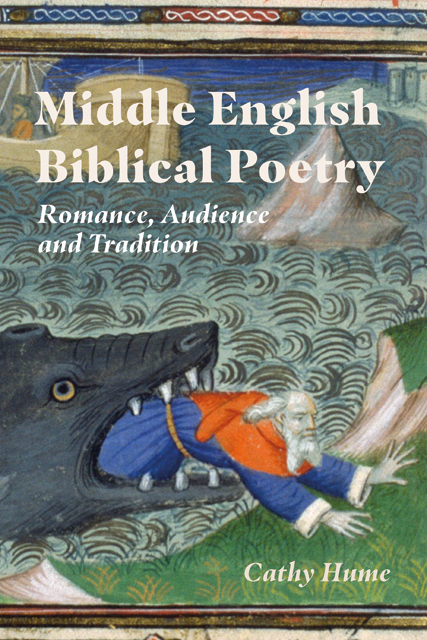Book contents
- Frontmatter
- Dedication
- Contents
- List of illustrations
- Acknowledgements
- List of abbreviations
- Note on translations
- Introduction
- 1 Iacob and Iosep: a happy tale of a knightly family
- 2 Two lives of Adam and Eve: exemplarity after the Fall
- 3 A Pistel of Susan: beauty in a Babylonian garden
- 4 Patience: anti-romance
- 5 Cleanness: household virtues, familiar sins
- Conclusion
- Bibliography
- Index of manuscripts
- General index
Conclusion
Published online by Cambridge University Press: 04 January 2024
- Frontmatter
- Dedication
- Contents
- List of illustrations
- Acknowledgements
- List of abbreviations
- Note on translations
- Introduction
- 1 Iacob and Iosep: a happy tale of a knightly family
- 2 Two lives of Adam and Eve: exemplarity after the Fall
- 3 A Pistel of Susan: beauty in a Babylonian garden
- 4 Patience: anti-romance
- 5 Cleanness: household virtues, familiar sins
- Conclusion
- Bibliography
- Index of manuscripts
- General index
Summary
The image on the cover of this book does not come from one of the manuscripts of Middle English biblical poetry – which are sadly short on illustrations – but from the Jonah section of a fourteenth-century Bible Historiale. Nevertheless, it is so delightfully characteristic of medieval vernacular biblical culture that it encapsulates, in miniature form, the central arguments I have been making. First, there is the whale. Shaped like a cylinder, with a few large, widely spaced teeth and an enormous hollow stump for a blowhole, it does not appear to have been painted from personal observation. Rather, it is designed to emphasise strangeness and evoke wonder at its black monstrosity. The image perfectly expresses the taste for the marvellous and the extraordinary that it shares with the poems discussed in this book – a taste more normally associated with romance.
This is what A Pistel of Susan seems to mean when it promises its audience ‘ferlys’. Perhaps the poet is referring specifically to God’s inspiration of his prophet Daniel, the only strictly supernatural moment of the story – but more probably, it is a loose gesture towards the exotic story it tells, set in a superlative Babylonian garden where rhubarb grows and parrots fly, peopled with characters of either extraordinary virtue and beauty or extraordinary villainy. This taste for the marvellous affects different poems in different ways. In the Auchinleck Life of Adam and Eve, the mysterious movements of the angel are presented as an enjoyable source of wonder. In Iacob and Iosep, the hero is – like Susanna – astonishingly beautiful, and placed in a context that is doubly exotic, longing for the Hebrew songs of his childhood while displaced in an Egypt described using romance vocabulary. The Canticum de Creatione also evokes exotic tradition with its reference to an imaginary Hebrew source. The Gawain-poet embraces this tendency and takes it to new heights. His extended descriptions of the inside of the whale and the marvellous woodbine in Patience are glorious poetic set-pieces, while Cleanness revels – sometimes with dubious taste – in the environmental catastrophe of the Flood, the post-apocalyptic landscape of the Dead Sea and the terrifying apparition of the disembodied hand at Belshazzar’s Feast.
- Type
- Chapter
- Information
- Middle English Biblical PoetryRomance, Audience and Tradition, pp. 185 - 190Publisher: Boydell & BrewerPrint publication year: 2021



